
 i_need_contribute
i_need_contribute

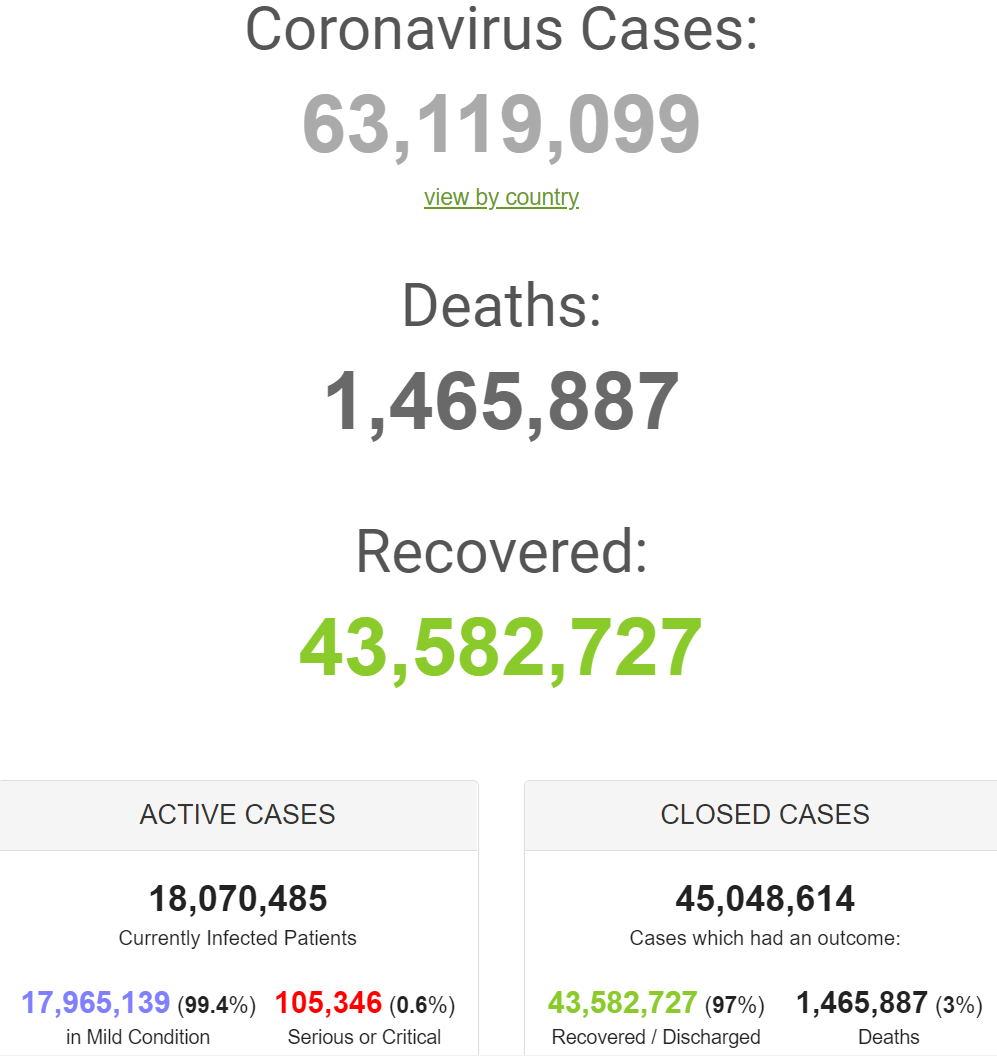
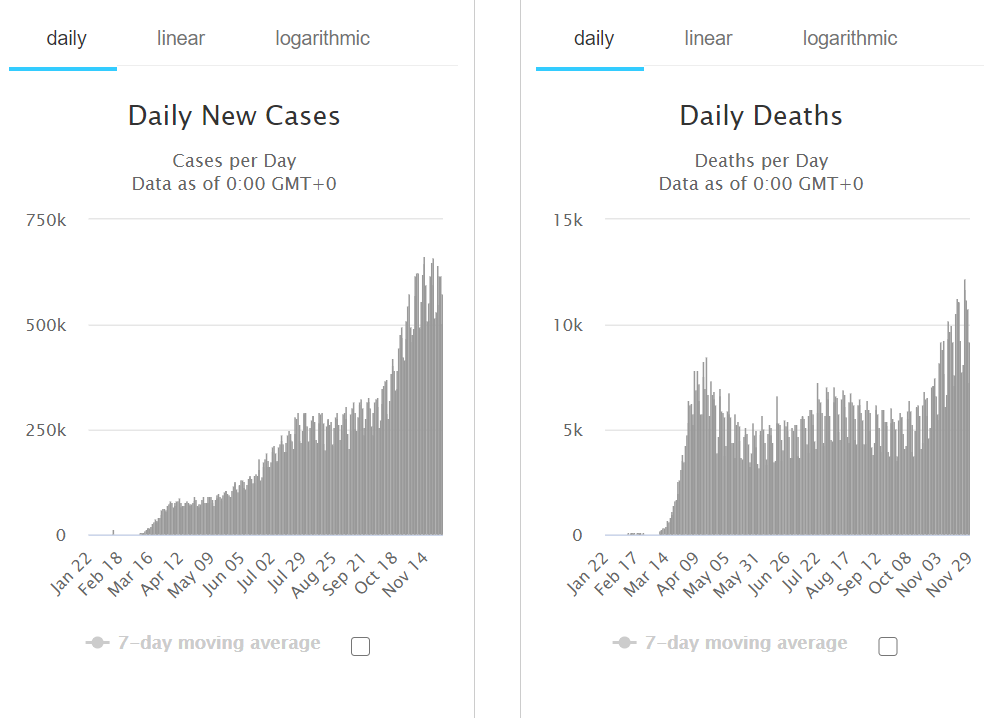
|
Country, |
Total |
New |
Total |
|
World |
63,059,560 |
+502,243 |
1,464,850 |
|
13,750,608 |
+138,096 |
273,077 |
|
|
9,432,075 |
+39,036 |
137,177 |
|
|
6,314,740 |
+24,468 |
172,848 |
|
|
2,269,316 |
+26,683 |
39,527 |
|
|
2,218,483 |
+9,784 |
52,325 |
|
|
1,646,192 |
+8348 |
44,668 |
|
|
1,617,327 |
+12,155 |
58,245 |
|
|
1,585,178 |
+20,648 |
54,904 |
|
|
1,418,807 |
+5,432 |
38,473 |
|
|
1,308,376 |
+8,763 |
36,584 |
|
|
1,100,683 |
+10,008 |
105,459 |
|
|
1,055,607 |
+13,637 |
16,533 |
|
|
985,075 |
+11,483 |
17,029 |
|
|
962,530 |
+2,162 |
35,923 |
|
|
948,749 |
+12,950 |
47,874 |
|
|
787,702 |
+2,563 |
21,477 |
|
|
722,679 |
+12,978 |
12,213 |
|
|
607,628 |
+29,281 |
13,558 |
|
|
574,448 |
+3,619 |
16,461 |
|
|
550,435 |
+1,614 |
12,224 |
|
|
550,430 |
+1,489 |
15,356 |
|
|
534,266 |
+6,267 |
16,815 |
|
|
519,723 |
+1,074 |
8,138 |
|
|
518,910 |
+5,585 |
9,349 |
|
|
471,536 |
+5,554 |
11,193 |
|
|
462,407 |
+1,788 |
6,609 |
|
|
429,864 |
+2,076 |
8,373 |
|
|
395,185 |
+2,829 |
7,985 |
|
|
370,278 |
+5,468 |
12,032 |
|
|
357,128 |
+217 |
5,884 |
|
|
353,803 |
+4,115 |
5,789 |
|
|
335,598 |
+809 |
2,864 |
|
|
294,799 |
+4,093 |
4,427 |
|
|
279,708 |
+4,047 |
3,105 |
|
|
231,978 |
+1,255 |
1,479 |
|
|
214,307 |
+3,598 |
2,694 |
|
|
211,527 |
+6,819 |
4,672 |
|
|
192,117 |
+1,208 |
13,423 |
|
|
169,214 |
+6,179 |
1,549 |
|
|
167,753 |
+1,251 |
570 |
|
|
164,729 |
+1,276 |
3,060 |
|
|
144,653 |
+2,585 |
2,106 |
|
|
144,592 |
+98 |
8,949 |
|
|
Dominican |
143,473 |
+820 |
2,330 |
|
142,486 |
+739 |
3,814 |
|
|
142,426 |
+231 |
878 |
|
|
138,648 |
+171 |
237 |
|
|
135,008 |
+1,684 |
1,151 |
|
|
134,768 |
+1,174 |
2,142 |
|
|
132,368 |
+4,426 |
1,230 |
|
|
130,865 |
+826 |
1,990 |
|
|
126,944 |
+1,266 |
1,004 |
|
|
126,612 |
+2,919 |
1,712 |
|
|
123,484 |
+905 |
1,418 |
|
|
121,971 |
+173 |
4,166 |
|
|
118,195 |
+4,170 |
1,361 |
|
|
115,541 |
+358 |
6,636 |
|
|
109,534 |
+604 |
1,700 |
|
|
107,513 |
+379 |
2,905 |
|
|
107,017 |
+1,165 |
2,290 |
|
|
105,733 |
+1,100 |
816 |
|
|
104,227 |
+1,193 |
2,321 |
|
|
102,040 |
+280 |
894 |
|
|
96,251 |
+1,271 |
3,219 |
|
|
89,486 |
+1,509 |
1,918 |
|
|
86,787 |
+142 |
341 |
|
|
86,512 |
+11 |
4,634 |
|
|
83,585 |
+1,695 |
717 |
|
|
83,316 |
+711 |
1,452 |
|
|
82,430 |
+1,157 |
1,166 |
|
|
82,221 |
+1,009 |
2,410 |
|
|
81,906 |
+775 |
1,743 |
|
|
79,352 |
+998 |
829 |
|
|
75,381 |
+1,117 |
1,384 |
|
|
72,870 |
+152 |
608 |
|
|
72,427 |
+456 |
1,266 |
|
|
72,241 |
+299 |
2,052 |
|
|
67,412 |
+82 |
1,173 |
|
|
64,485 |
+1,309 |
357 |
|
|
61,543 |
+820 |
1,731 |
|
|
60,193 |
+1,976 |
493 |
|
|
58,213 |
+8 |
29 |
|
|
51,569 |
+190 |
323 |
|
|
37,625 |
+835 |
798 |
|
|
35,828 |
+282 |
328 |
|
|
34,881 |
+427 |
487 |
|
|
34,539 |
+565 |
312 |
|
|
33,824 |
+449 |
523 |
|
|
27,893 |
+8 |
907 |
|
|
24,629 |
+322 |
393 |
|
|
5,312 |
+1 |
117 |
|
|
4,838 |
+5 |
45 |
|
|
3,977 |
+11 |
60 |
|
|
1,343 |
+2 |
35 |
Retrieved from: https://www.worldometers.info/coronavirus/
From CNN's Junko Ogura in Tokyo
Japan recorded 2,056 new Covid-19 cases on Sunday, according to its health ministry, with the number of serious infections in the country at its highest level yet.
The new infections bring Japan’s total caseload to 147,472. The country also recorded 13 virus-related fatalities Sunday, pushing its Covid-19 death toll to 2,132.
The number of people with severe Covid-19 symptoms has reached a record high, with 462 patients being treated in intensive care units on Sunday -- up 22 from the day before.
Tokyo: Of the new infections, 418 were recorded in the capital -- the fifth consecutive day that cases there have topped 400. Tokyo has reported a total of 40,628 Covid-19 cases.
Osaka: The second-biggest prefecture counted 381 new cases on Sunday, the fifth consecutive day that cases there have topped 300. Osaka also reported that six people, in their 70s to 90s, died on Sunday.
Some restrictions: On Saturday, karaoke venues and restaurants serving alcohol in Tokyo, Osaka, Sapporo, and Nagoya started three weeks of restricted business hours to help combat the resurgence in infections.
From CNN's Holly Yan and Madeline Holcombe
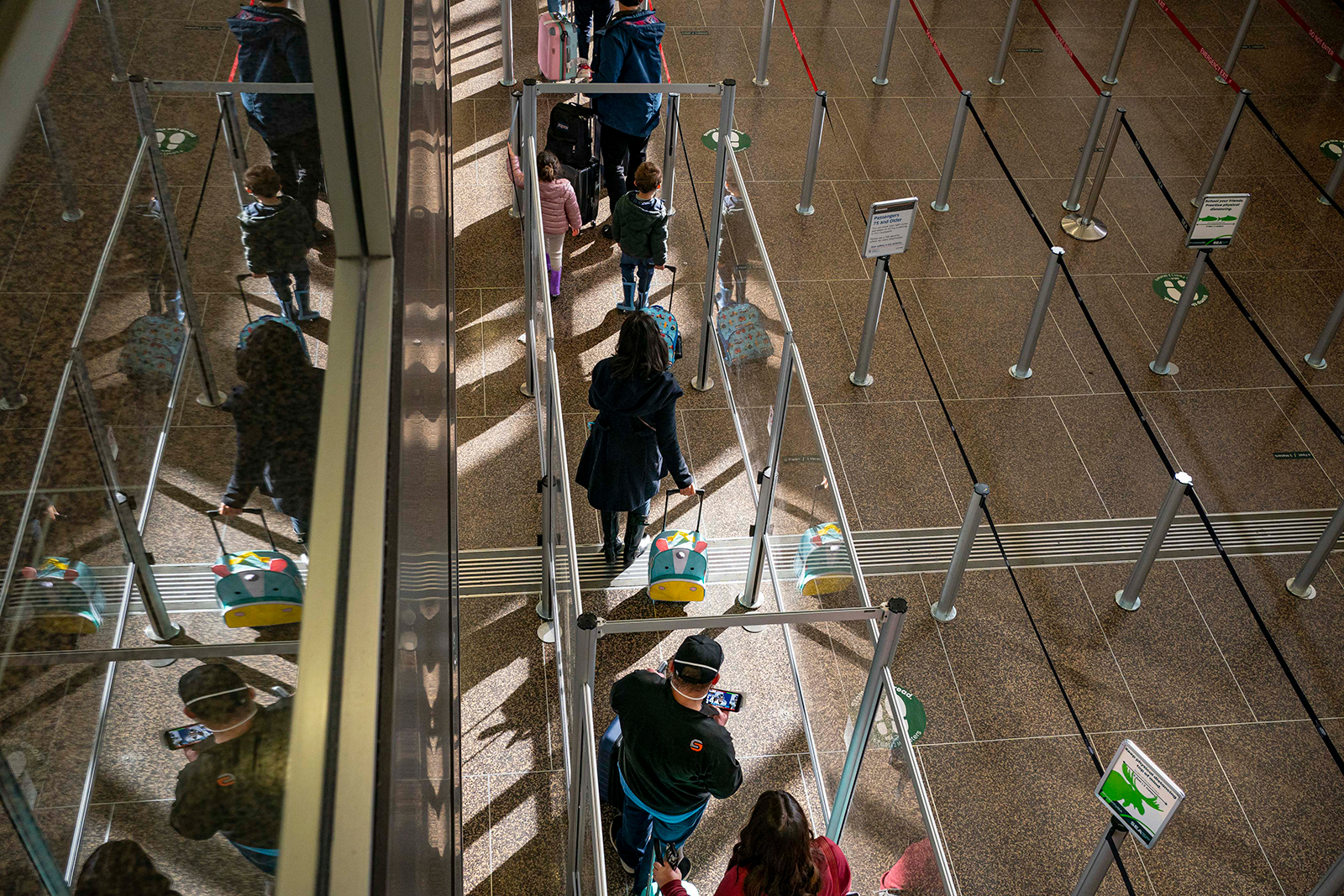
Travelers wait in line for security screening at Seattle-Tacoma International Airport on November 29, in Seattle. David Ryder/Getty Images
Sunday was expected to be the busiest US domestic air travel day of the entire pandemic -- even though the Centers for Disease Control and Prevention recommended that Americans not travel for Thanksgiving.
Roughly 6 million travelers passed through security at US airports after the CDC's travel warning in the week leading up to Thanksgiving.
But it will be weeks before anyone knows how much of a role Thanksgiving gatherings and travel play in new hospitalizations and deaths.
"When you look at people who are hospitalized today, they were infected two weeks ago, maybe more," said Dr. Jonathan Reiner, a professor of medicine at George Washington University. "And then it takes usually another week for folks to succumb to the illness."
So infections picked up on Thanksgiving "are going to show up in three weeks and are going to show up in deaths over Christmas and New Year's and are going to spread in every state," Ranney said.
Statistics reported in the days after the holiday might show a relative dip in Covid-19 cases, followed by a surge due to a lag in government agencies' reporting over the long weekend.
And given Covid-19's lengthy incubation time and how long it takes an infected person to test positive, cases related to Thanksgiving are unlikely to show in public data until the first full week of December at the earliest.
From CNN Health’s Naomi Thomas
The Covid-19 pandemic and reductions in access to effective antimalarial treatment caused by it could result in up to 100,000 additional deaths from malaria in Sub-Saharan Africa in 2020, according to the World Health Organization (WHO).
Many countries have reported moderate levels of disruption, the WHO's World Malaria Report 2020 said.
Modeling analysis showed that reductions in access to effective antimalarial treatment of 10% could lead to an additional 19,000 deaths in the region. A 50% reduction could lead to 100,000 additional deaths by the end of 2020 -- even if all prevention campaigns are completed.
Malaria prevention campaigns involve long-lasting insecticidal nets, indoor residual spraying and seasonal malaria chemoprevention.
“While Africa has shown the world what can be achieved if we stand together to end malaria as a public health threat, progress has stalled,” Dr. Matshidiso Moeti, WHO Regional Director for Africa, said in a news release Monday. “COVID-19 threatens to further derail our efforts to overcome malaria, particularly treating people with the disease.”
There were an estimated 229 million malaria cases and 409,000 related deaths in 2019.
Retrieved from: https://edition.cnn.com/world/live-news/coronavirus-pandemic-11-30-20-intl/index.html
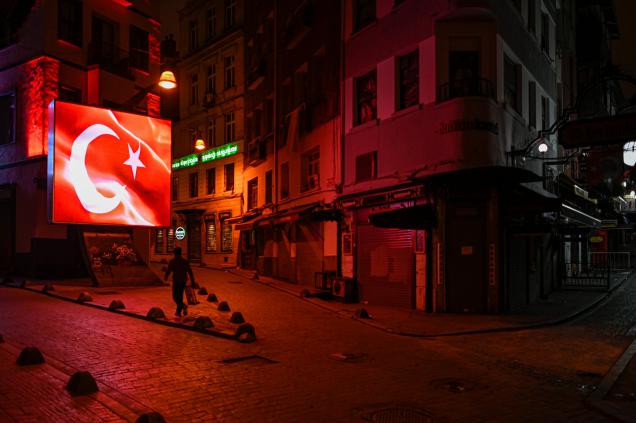
A scene in Istanbul late Wednesday.Credit...Associated Press
Turkey is showing a sharp rise in Covid-19 infections, in particular in the major cities of the country’s west. Hospitals are feeling the strain, with intensive care units in Istanbul and the capital, Ankara, running at 75 percent capacity, the country’s health minister Fahrettin Koca said.
“There is heavy increase of patients in Istanbul; risk continues,” he said in Turkish on Twitter Saturday, writing in capital letters for emphasis.
“We have 4,903 seriously ill patients detected today, ” he said in another post. “Each of us is responsible for following the measures. This is not a personal choice, but a social necessity.”
Doctors’ associations in Turkey have been warning for weeks about the soaring numbers of infections, and have criticized the government for not being candid about the virus’s spread in the country.
Turkey runs an extensive testing program, but for four months the Health Ministry released figures only for hospitalized patients, not for all those testing positive for the virus, as most countries do. When the ministry began releasing figures for confirmed cases last week, they were running at up to 30,000 a day.
The number of Covid-19 patients in Turkey’s hospitals has more than doubled this month, to 6,714, and the country reported 182 deaths on Saturday, for a total of at least 13,370 since the pandemic’s start.
Associated Press in Colombo
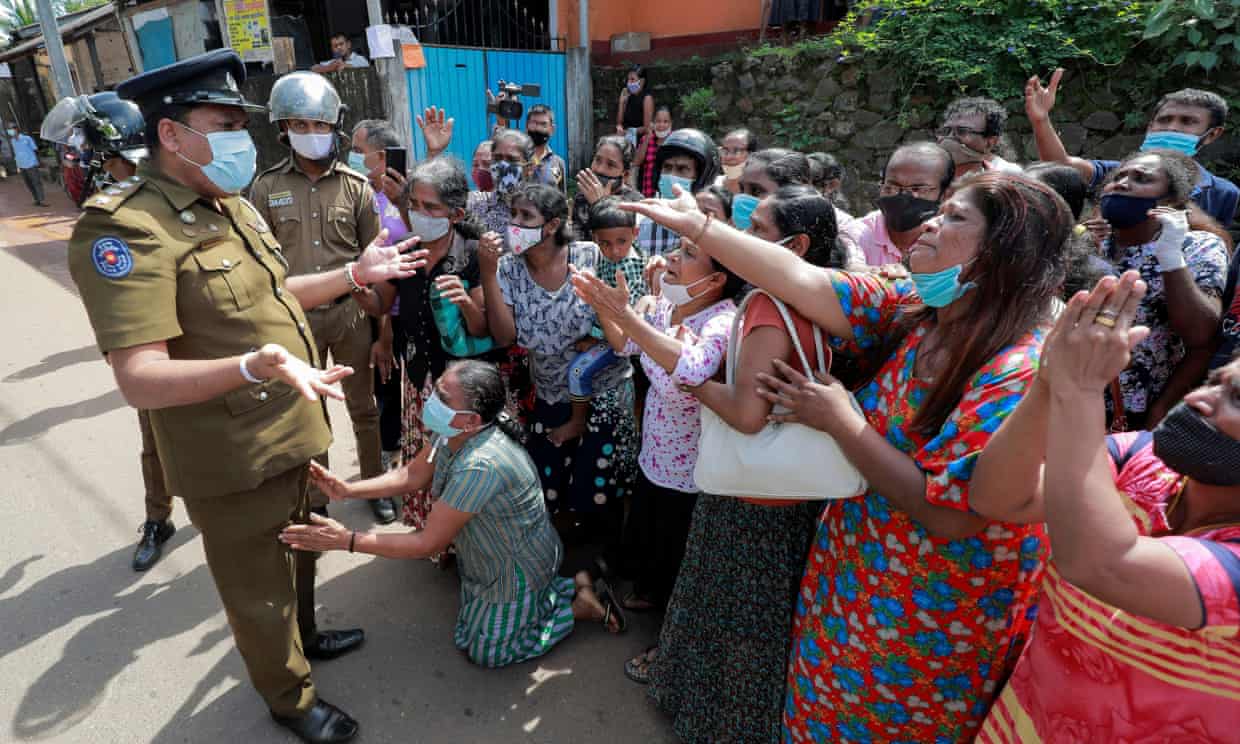
Families of prisoners argue with a police officer following unrest at Mahara prison near Colombo. Photograph: Dinuka Liyanawatte/Reuters
Six inmates were killed and 35 others injured when guards opened fire to control a riot over coronavirus conditions at a prison on the outskirts of Sri Lanka’s capital, officials have said.
Two guards were critically injured.
Pandemic-related unrest has been growing in Sri Lanka’s overcrowded prisons. Inmates at several prisons have staged protests in recent weeks as the number of coronavirus cases surges inside the facilities.
The police spokesman Ajith Rohana said inmates created “unrest” on Sunday at Mahara prison, about 10 miles (15km) north of Colombo. “The unrest situation turned into a prison riot,” he said, adding that prisoners tried to take control of the prison and hundreds attempted to escape.
The inmates “reportedly destroyed most of the property including offices inside the prison”, Rohana said. Guards opened fire, and the clash left six inmates dead and 35 injured, he said, and two prison officers were critically injured.
He said hundreds of additional police were deployed to help the guards and strengthen security around the prison.
An inmate was killed in similar unrest at another prison last week. Another died in March.
More than a thousand inmates in five prisons have tested positive for coronavirus and at least two have died. About 50 prison guards have also tested positive.
Senaka Perera, a lawyer with the Committee for Protecting Rights of Prisoners, said the inmates at Mahara prison had been frustrated because their pleas for coronavirus testing and separation of infected prisoners had been ignored by officials for more than a month.
On Monday, about 500 relatives of inmates gathered in front of the prison and urged the authorities to provide information about the prisoners and ensure their safety. Sujeewa Silva said her son has been detained at the facility for seven months after being arrested on drug charges. “I want to know whether he is safe. I asked the officer: please tell me the condition of my son,” she said.
Sri Lankan prisons are highly congested with more than 26,000 inmates crowded into facilities with a capacity of 10,000.
Sri Lanka has experienced a surge in the coronavirus since last month when two clusters – one centred at a garment factory and another at a fish market – emerged in Colombo and its suburbs. Confirmed cases from the two clusters have reached 19,449. Sri Lanka has reported a total number of 22,988 coronavirus cases, including 109 deaths.
Retrieved from: https://www.theguardian.com/world/2020/nov/30/sri-lanka-prisoners-killed-in-riot-over-coronavirus-conditions
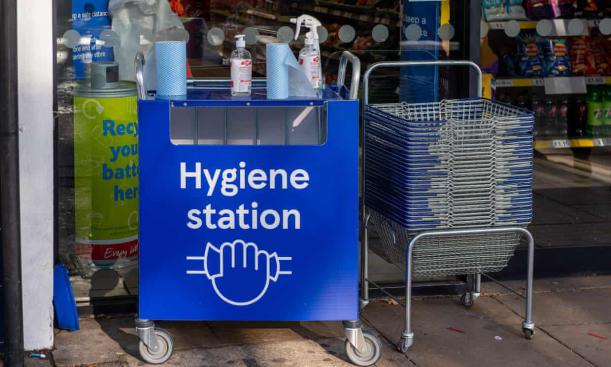
A Covid-19 hygiene station outside a Tesco Express in Ascot High Street in Berkshire. Photograph: Maureen McLean/Rex/Shutterstock
Shops will be given permission to trade around the clock as the high street tries to recoup some of the losses it has suffered during the pandemic, a cabinet minister has said.
Retailers normally have to go through a lengthy process to apply to local authorities under the Town and Country Planning Act if they wish to extend hours outside the window of 9am to 7pm.
But the communities secretary, Robert Jenrick, said he wanted to remove the bureaucracy to encourage greater trade – allowing shops to open for up to 24 hours a day in December and January.
Writing in the Daily Telegraph, he said: “With these changes local shops can open longer, ensuring more pleasant and safer shopping with less pressure on public transport. How long will be a matter of choice for the shopkeepers and at the discretion of the council, but I suggest we offer these hard-pressed entrepreneurs and businesses the greatest possible flexibility this festive season.
“As local government secretary I am relaxing planning restrictions and issuing an unambiguous request to councils to allow businesses to welcome us into their glowing stores late into the evening and beyond.”
It comes after Jenrick suggested some areas could be moved into a lower tier when the first 14-day review of the latest system of tiered local controls takes place in mid-December.
A record number of shops closed during the first half of 2020 due to the coronavirus lockdown, according to research from the Local Data Company and PwC.
A total of 11,000 chain operator outlets shut between January and August this year, while about 5,000 shops opened, leaving a net decline of 6,000 stores, almost double the drop during the same period last year.
Sir Philip Green’s Arcadia Group, which runs the Topshop, Dorothy Perkins and Burton brands, has been revealed to be on the brink of collapse with about 15,000 jobs at risk.
Retrieved from: https://www.theguardian.com/business/2020/nov/30/shops-allowed-trade-around-clock-recoup-covid-losses-robert-jenrick
The federal government has been sharply criticised by the disability royal commission for its “serious failure” in not adequately consulting people with disability or creating a specific plan to protect them at the start of the coronavirus pandemic.
Those failings “produced serious adverse consequences for many people with disability”, the commission said in a report tabled in parliament on Monday.
At the start of the crisis no government agency “made any significant effort to consult with people with disability or their representative organisations”, the report said.
“Even allowing for the novel challenges presented by the coronavirus, this was a serious failure.”
It said people with disabilities faced the “sudden loss of essential support services” and “impaired health and wellbeing” due to an “inability for prolonged periods to access essential supplies such as food and medications”.
People with disabilities experienced “extreme stress and anxiety” stemming from the fear of contracting the virus because of support staffing issues and a lack of PPE.
Others, especially people with cognitive disability, felt “significant distress”, because of a “lack of clear and consistent information”, the report said.
The commission noted there were “threats” to mental health for some in disability accommodation who felt “forgotten and ignored” while they dealt with “enforced isolation from family, friends and social networks and the absence of strategies to ameliorate the consequences of isolation”.
“The report exposes the neglect experienced by many people with disability, especially those with high support needs, during the early (crucial) stages of the Covid-19 pandemic,” it said.
“It is true that the pandemic, an event unprecedented in modern times, was bound to have a significant effect on all Australians regardless of the responses by the Australian government.
“But the impact of the pandemic on many people with disability, especially those with high support needs, would have been significantly ameliorated if the Australian government had complied fully with the letter and spirit of its obligations under the [UN convention] from the very outset of the pandemic.”
The commission noted that the government established an advisory committee on the health emergency response to coronavirus for people with disability on 2 April.
This was a “positive development” but should have happened sooner, the report said. It said the committee, or a similar body, should remain in place after the pandemic.
It also recommended the government establish and implement formal mechanisms for consulting and involving people with disability, including providing funding.
The commission held hearings in August focused on the pandemic, just as Victoria was experiencing its second wave.
On the second day of those hearings, the government began releasing statistics on the number of NDIS participants who had contracted the virus. The statistics cover only a fraction of the disability population in Australia.
But the royal commission said the government’s broader failure to collect or publish statistics on how many people with disability had contracted or died from the virus was “inconsistent with Australia’s obligations under article 31 of the United Nations Convention on the Rights of Persons with Disabilities”.
In August, the commission was told eight people who accessed NDIS services had died of Covid-19.
Yet the overall “deficiencies” in data collection meant there was no “accurate picture of the infection and mortality rates from Covid-19 for people with disability throughout Australia”.
The report also said the government did not provide disability support workers priority access to PPE at the start of the pandemic, “thereby exposing both the workers and the people with disability whom they supported to an increased risk of infection”.
It also failed to “introduce measures to make Covid-19 testing accessible to all people with disability”.
Further, it “failed to give clear guidance to service providers” about the differences between aged care and disability accommodation settings in infection control and outbreak management.
The federal government welcomed the report, but defended its record, arguing it had kept Australians with disability “overwhelmingly safe” in what was one of the “strongest outcomes in the world”.
The health minister, Greg Hunt, said the government “acted early on disability consultation” through February, March and April. It created the Management and Operational Plan for Covid-19 for People with Disability in April.
“The development of this plan involved significant collaboration between governments at all levels, disability and health sectors, academics and people with disability,” Hunt said.
“We also continue our work with jurisdictions to ensure flexible testing arrangements for people with disability and continued access to personal protective equipment (PPE).”
The NDIS minister, Stuart Robert, said: “The NDIA rapidly implemented a range of temporary measures to support NDIS participants, such as providing low-cost assistive technology, including smart devices, so participants could access telehealth services; the ability to claim for the cost of PPE; and greater plan flexibility.”
The Greens disability spokesperson, Jordon Steele-John, said the recommendations were a “vindication of the outrage and distress felt by disabled people and our families” during the pandemic.
“It proves that we were shut out of emergency response planning at the beginning of the pandemic, or not even considered, and as a result out lives were put at risk.”
· The US top infectious disease expert said Sunday that the country may see “surge upon a surge” of coronavirus cases in the weeks after Thanksgiving, and he does not expect current recommendations around social distancing to be relaxed before Christmas.
· The US Centers for Disease Control and Prevention on Sunday reported a total 13,142,997 cases of new coronavirus, an increase of 143,333 from its previous count, and said the number of deaths had risen by 1,210 to 265,166.
· Six inmates were killed and 35 others were injured when guards opened fire to control a riot at a prison on the outskirts of Sri Lanka’s capital, officials said Monday. Two guards were critically injured, they said. Pandemic-related unrest has been growing in Sri Lanka’s overcrowded prisons. Inmates have staged protests in recent weeks at several prisons as the number of coronavirus cases surges in the facilities.
· China’s factory activity expanded at the fastest pace in more than three years in November, while growth in the services sector also hit a multi-year high, as the country’s economic recovery from the coronavirus stepped up, Reuters reports.
· Japan’s serious cases reach record levels. In Japan, the number of Covid-19 patients with serious symptoms has reached record levels, as the country battles a third wave of infections. The number of people with severe symptoms rose to 462 on Sunday, the health ministry said - an increase of 22 from the previous day.
· Children in Iraq have started returning to school for the first time since late February, with social distancing measures in place and schools operating six days a week.
· Lebanon will begin to slowly relax coronavirus restrictions imposed two weeks ago from Monday, as it looks to boost its struggling economy ahead of Christmas.
· Turkey’s daily coronavirus death toll hit a record high for a seventh consecutive day on Sunday, with 185 fatalities in the last 24 hours.
· The WHO delivered 15 ventilators to hospitals in Gaza on Sunday as the Palestinian territory suffered a rise in Covid-19 infections.
· New York City’s state schools will start to reopen on 7 December, beginning with primary schools, the mayor, Bill de Blasio, announced on Sunday.